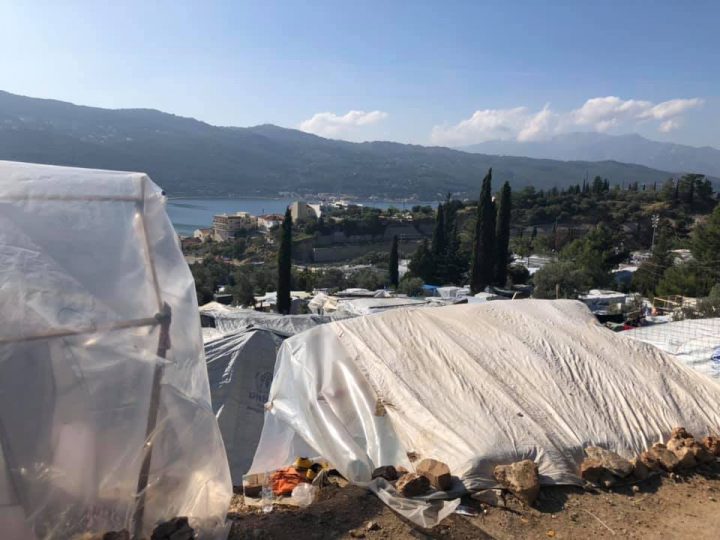Women and girls face relentless insecurity in Greece’s overcrowded Moria “hotspot” for asylum seekers and migrants on Lesbos island, Human Rights Watch said today, releasing a video that shows the dire conditions. The Greek government should take immediate action to ensure safe, humane conditions for women and girls in line with their international human rights obligations and standards for humanitarian emergencies.
As of December 2, 2019, the Moria Reception and Identification Center was holding nearly 16,800 people in a facility with capacity for fewer than 3,000. Overcrowding has led authorities, as well as some asylum seekers and migrants themselves, to erect shelters outside Moria’s fenced boundaries, first in the adjacent area called the Olive Grove and now in a second olive grove, which has no water and sanitation facilities. In all areas, women and girls, including those traveling alone, are living alongside unrelated men and boys, often in tents without secure closures.
“Just going to the bathroom feels too risky for women and girls in Moria,” said Hillary Margolis, senior women’s rights researcher at Human Rights Watch. “Their lives are defined by fear, and that won’t change unless the Greek government addresses the pervasive dangers they face.”
During research on Lesbos in October, Human Rights Watch found women and girls in and around Moria lack safe access to essential resources and services including shelter, food, water and sanitation, and medical care. Interviews with 32 women and 7 girls, as well as 7 representatives of aid agencies working on Lesbos, revealed a threatening environment, with few protections from sexual harassment and gender-based violence.
Women and girls said they avoid leaving their shelters or using the toilets, bathing, or waiting in food distribution lines due to fear. Parents said they do not allow their daughters to go out unaccompanied, including to attend school. “I don’t go out [of the tent] alone,” said Naima, 12, who lives in the Olive Grove with her mother and 14-year-old sister. “The men and boys looking at me, I don’t like it…. [If I need the toilet at night], I have to wait all night – I have no choice.”
Women with disabilities face additional barriers because the toilets and showers are far from their shelters over rough terrain or are not adaptable for people with disabilities. Aid workers handling cases of sexual and gender-based violence said protection systems are virtually nonexistent, exposing women and girls to high risk that has increased with overcrowding.
A high-level Greek official said during a call with Human Rights Watch that maintaining adequate conditions in the camps is impossible, especially following recent large numbers of arrivals, because Greece is hosting asylum seekers and migrants well beyond the facilities’ capacity. He noted the pressure on Greece and lack of support from other European Union countries. “Greece cannot be the gatekeeper of Europe, as it is being asked to be by the EU, and also be expected to respect human rights fully,” he said.
Conditions in Moria violate Greece’s obligations to migrants and asylum seekers under international law and fall far below standards of treatment developed for humanitarian emergencies around the world, Human Rights Watch said.
With the intent of facilitating speedy processing and return to Turkey under the EU-Turkey deal, Greece has adopted a “containment policy” that traps people in under-resourced camps on the Aegean islands while awaiting the outcome of their asylum claims or return, which can take months or even years. Combined with a lack of government-supported services, this creates an inordinate burden for aid agencies, which provide almost all camp services, interviewees said.
The government’s move in July to stop issuing social security numbers to asylum seekers exacerbates the situation, obstructing their access to public health services except in emergencies. Aid agency representatives said overwhelming demand means they sometimes have to turn away all but the most extreme cases for medical care and gender-based violence support. “Organizations just can’t respond anymore to the increased needs,” said one service provider. “People are being pushed to make horrifying decisions.”
Under Greek law, the authorities should identify “vulnerable” people, including pregnant women and new mothers, survivors of sexual and other serious violence, single parents with children under 18, and people with disabilities, and refer them to appropriate support services and accommodation. This may include housing in apartments outside of Moria.
Human Rights Watch interviewed women and girls who meet current vulnerability criteria but said they had not been screened for vulnerability or identified as vulnerable after weeks or even months, including survivors of gender-based violence, pregnant women, new mothers, women with disabilities, and women alone with children under 18. Since late 2018, staff resignations and shortages at the government agency conducting vulnerability screenings in Moria have led to lengthy delays in identification of vulnerable individuals, and resulting delays in any additional support.
The Greek government should urgently improve security and living conditions for women and girls in Moria, ensuring safe access to secure shelter, food, adequate water and sanitation, and specialized medical care. The government should identify and assist vulnerable asylum seekers and migrants on Greek islands, including survivors of gender-based violence, women alone with children under 18, pregnant women, new mothers, and people with disabilities. It should prioritize awareness-raising about existing services and availability of trained female interpreters.
Other EU countries should share responsibility for accepting asylum seekers and migrants, processing their asylum applications, and facilitating family reunification.
“Women and girls who have come to Greece seeking safety are finding the exact opposite at Moria, and the situation is only getting worse,” Margolis said. “The Greek government has a duty to make sure women and girls don’t have to hide in tents all day out of fear.”
For more information on risks for women and girl asylum seekers on Lesbos, please see below.
For more Human Rights Watch reporting on Greece, please visit:
https://www.hrw.org/europe/central-asia/greece
For more Human Rights Watch reporting on women’s rights, please visit:
https://www.hrw.org/topic/womens-rights
Additional information at this link










